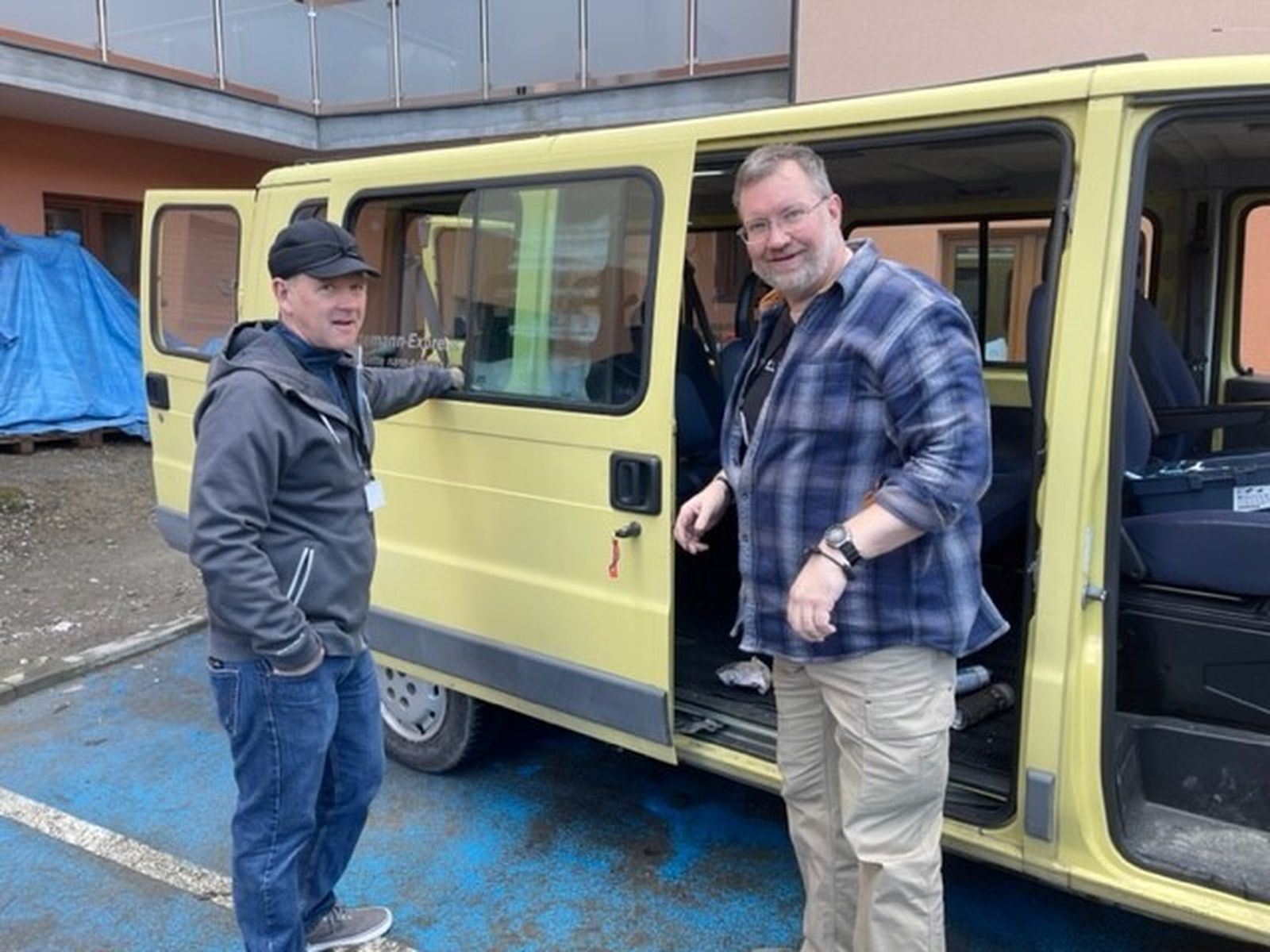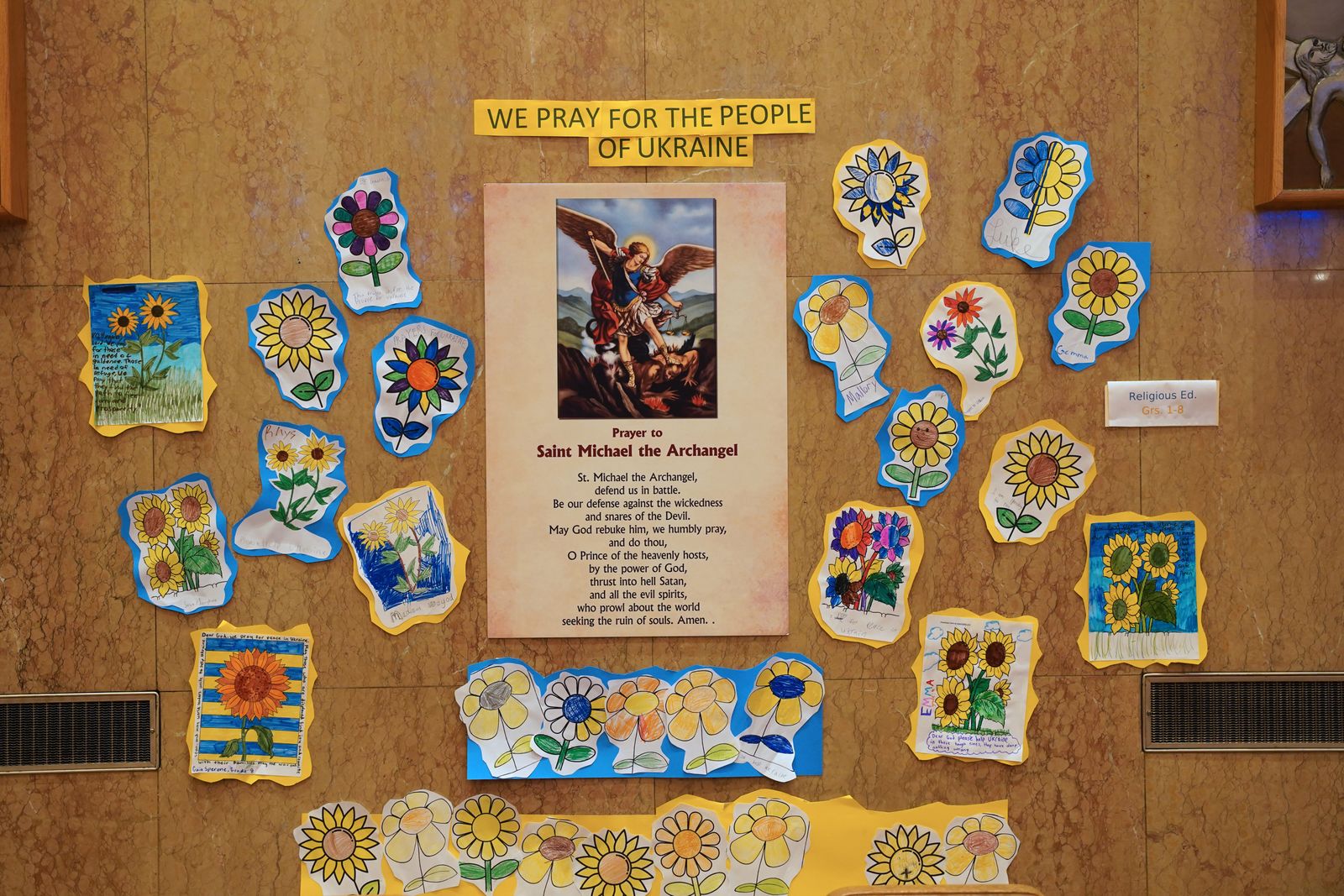Grosse Pointe parish has sent five cohorts to Poland-Ukraine border since the war began to house, feed and clothe refugees
GROSSE POINTE PARK — It was two days after Russia invaded Ukraine on Feb. 24, 2022, that Fr. Marek Machala was appointed to his new assignment as director of the Department of Family Pastoral Care for the Archdiocese of Przemysl, Poland.
It’s a role that usually entails organizing programs and faith formation opportunities for families.
But after Feb. 24, 2022, Fr. Machala's focus was on making sure mothers and children who trekked 15 miles through a war zone on foot could find a place to stay for the night.
Przemysl has a population of 60,000 and is the main city in a region of southeastern Poland that shares the longer Polish-Ukrainian border. In a matter of weeks, 60,000 people a day — the size of the town itself — would come by road and rail to the region, seeking to escape Europe’s largest war in a quarter century.
“It is more than 1.2 million people crossing just the Przemysl city alone,” Fr. Machala told Detroit Catholic on Aug. 24, the six-month anniversary of the Russian-Ukrainian War, while visiting St. Clare of Montefalco Parish in Grosse Pointe Park. “Cars, buses, people walking to the border crossing, all coming to the city. They were going to other cities in Poland and Europe, but those first nights they were in Przemysl.”
It was those first nights that became Fr. Machala’s primary concern. As vice rector of Przemysl’s seminary, he housed some families there. There were a few retreat centers in the archdiocese that could house more people. Families would have to share single rooms; supplies would be limited, and it would take a while before refugees could move on to more suitable quarters. But it was something.

Before the refugees could be settled, they were processed in former shopping centers — a nearly endless line of people who were missing their homes, their families, their livelihoods, but just looking to escape.
“If you could imagine, five, six thousand people in a former supermarket, maybe 2,000 people in line for the toilet, a room of 3,000 cots all lined up in row, with the light switch on every day. It was very hard for refugees,” Fr. Machala said.
Fr. Machala reached out to friends near and far for support, including Fr. Andrew Kowalczyk, CMSA, a Polish compatriot who was serving as pastor of St. Clare of Montefalco Parish in Grosse Pointe Park.
When the war started, Fr. Kowalczyk began to recruit parishioners who were interested in traveling to Poland to help during the crisis. The response was overwhelming, and right before Easter, 18 people from Metro Detroit were flying to Poland.
“We saw things on network TV and thought we knew what we were in store for, but weren’t quite sure,” said Michael McDevitt, a St. Clare of Montefalco parishioner. “We got our luggage inside the seminary where we were staying, and Fr. Marek announced he wanted to split our group in half, with one group leaving in 15 minutes to go pick up a family at the Tesco Center.”
Tesco was the primary destination point for refugees, where paperwork was filed, people passed background checks, families waited, and all the necessary work to claim refugee status was made.
“You saw this sea of humanity where everyone was doing whatever they could to get them in the building,” McDevitt said. “It was there where people would register, speak with different country representatives and rest before the next journey.”

Volunteers from St. Clare were put to work driving families to the retreat center or other accommodations, sorting donated clothing, fixing vans and transport vehicles, and turning the normally quiet retreat center into a makeshift hotel for thousands of families.
Jack Lintol of St. Daniel Parish in Clarkston was part of a second team of volunteers who arrived in Poland in late May.
“I was surprised there was as much help there, like World Central Kitchen and other organizations who were right there at the border,” Lintol said. “When I picked up refugees, generally 95 percent were women and children, usually grandmothers, mothers and children. The men were conscripted to fight, so they stayed back to fight for their country and their freedom. When I met these people, I could see how they were broken, how fearful they were. There was a lack of trust on who I was and why I was there.”
By the time Lintol got to Poland, the conflict was more than three months old, so the rate of refugees crossing the border had slowed. But the need was still there.
“The border crossings have slowed down, but many (Ukrainians) have moved closer to the border of Ukraine, but still in Ukraine, living in tents, temporary housing and basements," Lintol said. "But when things get cold in the winter, they are going to be coming across the border, especially if the fighting continues in the east.”
An estimated 12 million refugees have fled Ukraine; 5.5 million have gone through Poland, with 1.2 million alone going through Przemysl.

Fr. Machala and his team of Polish and Ukrainian staffers, plus volunteers from around the world, have provided more than 30,000 nights of rest for people escaping the war. Most refugees express a desire to return to Ukraine and rebuild their country, but Fr. Machala said the first goal is to be safe and stay alive.
“When they come to see me, they ask what to do,” Fr. Machala said. “The first thing I say is, 'Get some rest.' It’s impossible for all these 5 million refugees to stay in Poland, so we are getting them to move on in smaller groups to France, Spain, Germany, Great Britain, Italy and Sweden. We're looking for other organizations and good people to work with.”
After the initial shock, Fr. Machala said the next step is helping refugees secure three meals a day, clean clothes, medical, dental and mental health care, and working toward finding more suitable lodgings in either Poland or another country accepting refugees.
“We try to get them an education, medical and psychological care and rebuild a sense of safety, security and dignity,” Fr. Machala said. “This is my main goal and spirituality. I don’t serve only the human being; I try to see Jesus Christ himself, coming in the person of those suffering, who are cold, who are hungry, who are thirsty, who are homeless. I try to help him. It is our mission.”
St. Clare of Montefalco has sent five groups to date to Poland, but further efforts are contingent upon need, the skills of volunteers and plane ticket prices — roundtrip ticket prices have increased from $900 to $2,200 since the war started.

“The first trip was opened for anyone who wanted to go, but when we came back, we wanted to be more intentional about who was being sent," said Sue Buckley, a St. Clare parishioner. "We created more of a process to screen people, matching people who spoke the language, who were dentists and doctors, who knew welding. Right now we are looking for people who have an international driver's license or can drive a stick shift."
Other needs include auto mechanics to fix the rundown vans Fr. Machala's group uses to transport refugees, plumbers to help with the pipes at the retreat center, and dentists. The next trip isn't officially scheduled yet.
Those who have gone to Poland say their own world has changed, but it continues to change the lives of those who still live in its midst.
Fr. Machala can’t guarantee refugees when the war will end or when it will be safe to return to Ukraine, but the important thing for now is they are safe, he says.
“I try to explain to them, 'If the war ends, it’s not difficult to get back home from France,'” Fr. Machala said. “It can be easier to get from France or Poland back to Ukraine after the war, but for now, it’s not possible. It all depends on the war.
“If Russia wins, for many of them it will be very dangerous to go back,” Fr. Machala added. “Most of the people I’ve met want to go back; they want to rebuild their lives and their homes as quickly as possible. We will see how long it takes. It could be months, it could be years, but I’m dedicated to serving Christ where I can, with these people, who for me, are Christ coming to me.”
Copy Permalink
Parish life












